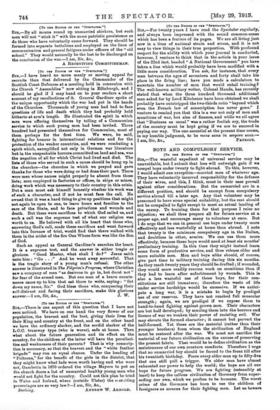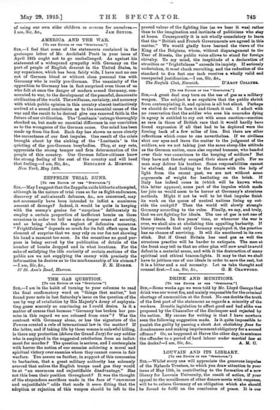BOYS AND COMPULSORY SERVICE.
[TO Ten Mee. 07 Tee "srsrrsroa."]
Sin,—The wasteful expedient of universal service may be unavoidable, but I submit that loss will outweigh gain if we compel boys under twenty to fight abroad. To this, however, I would admit one exception—married men of whatever• age. They have voluntarily incurred responsibility for the defence of their wives, and this, I think, must in their ease prevail against other considerations. But the unmarried are in a different position, and should be exempt from compulsory service abroad till a later age. Any that volunteer may be presumed to have some special suitability, but the rest should not be compelled to fight except to meet an actual landing of the enemy. To training them for that purpose I raise no objection; we shall thus prepare all for future service at. a proper age, and encourage many to volunteer at once. But I do urge that we can in general use boys under twenty more effectively and lees wastefully at home than abroad. I note that twenty is the minimum compulsory age in the Italian, and doubtless in other, armies. We can nee them more effectively, because these boys would need at least six months' preliminary training. In this time they might instead learn some form of productive service, and thus release older and more suitable men. Men and boys alike should, of course, give part time to military training during this six months. As they reach twenty years they should be drafted ; if wounded, they would more readily resume work on munitions than it they had to learn after enfeeblement by wounds. This is also a less wasteful use of these boys, for their con- stitutions are still immature; therefore the waste of life under service hardships would be excessive. If we antici- pate a long war, it is a mistake to begin by prodigal use of our reserves. They have not reached full muscular strength ; again, we are prodigal if we expose them to hand-to-hand fighting against grown men. Their characters are but half developed; by sending them into the horrors and licence of war we weaken their power of resisting evil. War may elevate the formed character ; it cannot but pervert the half-formed. Yet these are the material (rather than their younger brothers) from whom the civilization of England most be restored after the war. We must not sacrifice the material of our future civilization on the excuse of preserving the present fabric. That would be to define civilization as the maintenance of our own creature comforts. Therefore I urge that no unmarried boy should be forced to the front till after his twentieth birthday. Force every older man up to fifty-five that can still pull a trigger. We older men have almost exhausted our power to help the world; the boys are all our hope for future progress. We are fighting (ostensibly at least) to keep the callous civilization of Germany from super- seding our own, which we profess to be humane. The worst crime of the Germane has been to use the children of foreigners as screens for their fighting men. Let na beware of using our own elder children as screens for ourselves.—



































 Previous page
Previous page